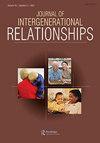Qualitative Comparison of In-Person versus Virtual Versions of the Same Intergenerational Service-Learning Program During Covid-19
IF 1
Q3 GERONTOLOGY
引用次数: 0
Abstract
ABSTRACTDuring Covid-19, most in-person intergenerational service-learning programs were halted or transitioned to virtual formats due to social-distancing guidelines. This study qualitatively examined in-person and virtual versions of the Lives Well Lived program, which matches older adults (OAs) with undergraduate students to participate in a mutual interviewing, life review project. Post-test data from open-ended questions were analyzed to compare themes regarding program outcomes. Recognition of OA interindividual differences, intergenerational relationship’s value, and decreased fear of aging themes developed in both program versions but there were also differences. Participants in the virtual version regretted not engaging in person, did not mention altruism/empathy, expressed appreciation of peer relationships in addition to OA relationships, and disliked writing reflection papers. Recommendations are given for ensuring similar learning outcomes when engaging in virtual programming, whether due to COVID-19 or in additional situations to pandemics, such as rural settings, lack of transportation/mobility, or time limitations.KEYWORDS: Agingvirtualintergenerationalservice-learninggerontology AcknowledgmentsThanks to Sky Bergman, Lives Well Lived filmmaker for her participation in the Lives Well Lived project and Dr. Phyllis Solomon for her mentorship.Disclosure statementNo potential conflict of interest was reported by the author(s).Contributions to the FieldThis study advances the intergenerational field by (1) providing guidance to those wanting to implement a short, virtual, intergenerational service-learning program; (2) elucidating some of the similarities and differences in student experience when participating in virtual vs. in-person versions of the same program; (3) exemplifying use of comparative qualitative studies when investigating the efficacy of intergenerational interventions delivered through both virtual and in-person modalities.Supplementary materialSupplemental data for this article can be accessed online at https://doi.org/10.1080/15350770.2023.2261441Covid-19期间同一代际服务学习计划的面对面与虚拟版本的定性比较
【摘要】在2019冠状病毒病期间,由于保持社交距离的指导方针,大多数面对面的代际服务学习项目被停止或过渡到虚拟形式。本研究定性地考察了“美好生活”项目的真人版和虚拟版,该项目将老年人(oa)与本科生匹配,让他们参与一个相互访谈、生活回顾的项目。对开放性问题的测试后数据进行分析,以比较有关项目结果的主题。对OA的个体间差异、代际关系价值和对衰老主题的恐惧减少的认识在两个项目版本中都有所发展,但也存在差异。虚拟版本的参与者后悔没有亲自参与,没有提到利他主义/同理心,除了OA关系外,还表达了对同伴关系的赞赏,并且不喜欢写反思论文。提出了建议,以确保在进行虚拟编程时取得类似的学习成果,无论是由于COVID-19还是在大流行的其他情况下,如农村环境、缺乏交通/机动性或时间限制。致谢感谢《活得好》电影制作人Sky Bergman参与了《活得好》项目,感谢Phyllis Solomon博士的指导。披露声明作者未报告潜在的利益冲突。对该领域的贡献本研究通过以下方式推进了代际领域:(1)为那些希望实施短期、虚拟的代际服务学习计划的人提供指导;(2)阐明学生在参与同一项目的虚拟版本和真人版本时体验的一些异同;(3)在调查通过虚拟和面对面方式提供的代际干预的有效性时,举例说明了比较定性研究的使用。补充材料本文的补充数据可在https://doi.org/10.1080/15350770.2023.2261441上在线获取
本文章由计算机程序翻译,如有差异,请以英文原文为准。
求助全文
约1分钟内获得全文
求助全文
来源期刊

Journal of Intergenerational Relationships
GERONTOLOGY-
CiteScore
2.80
自引率
14.30%
发文量
31
期刊介绍:
The Journal of Intergenerational Relationships is the forum for scholars, practitioners, policy makers, educators, and advocates to stay abreast of the latest intergenerational research, practice methods and policy initiatives. This is the only journal focusing on the intergenerational field integrating practical, theoretical, empirical, familial, and policy perspectives.
 求助内容:
求助内容: 应助结果提醒方式:
应助结果提醒方式:


